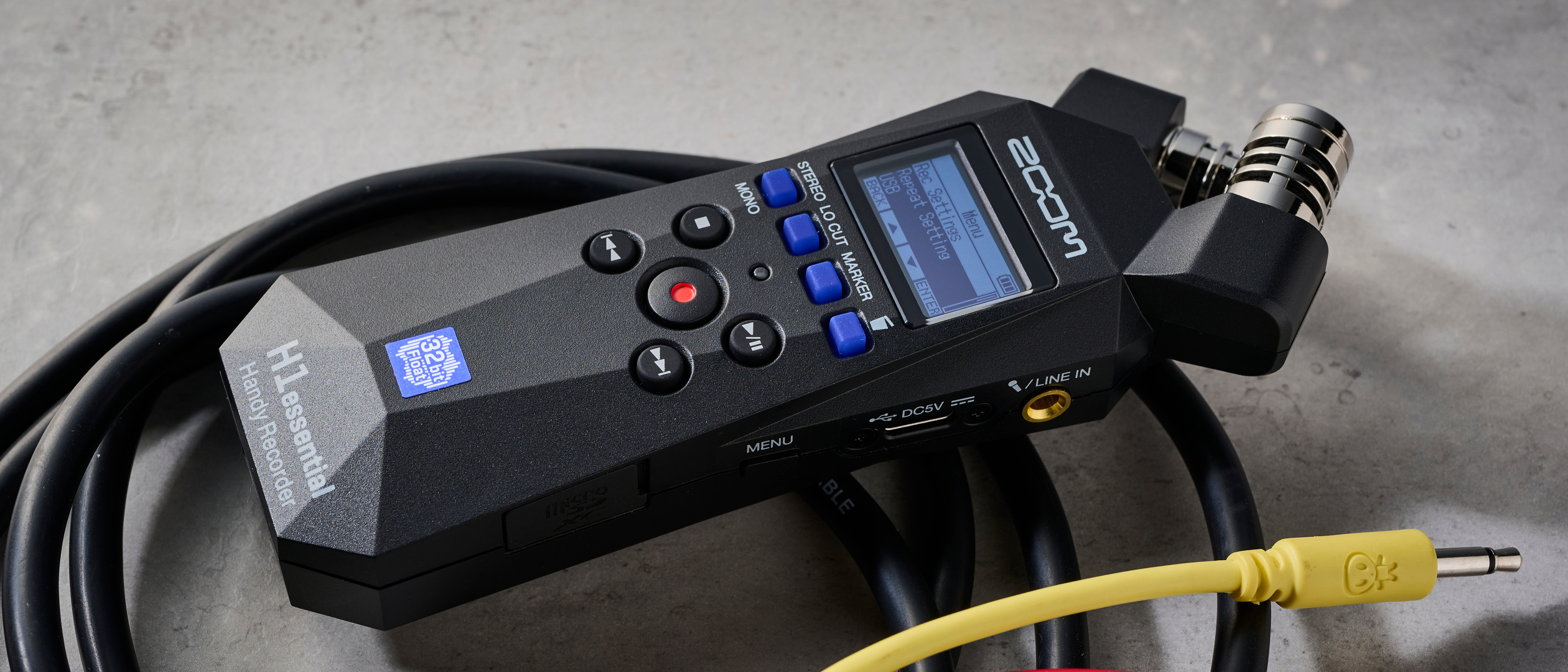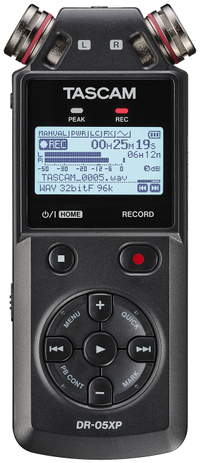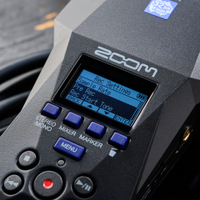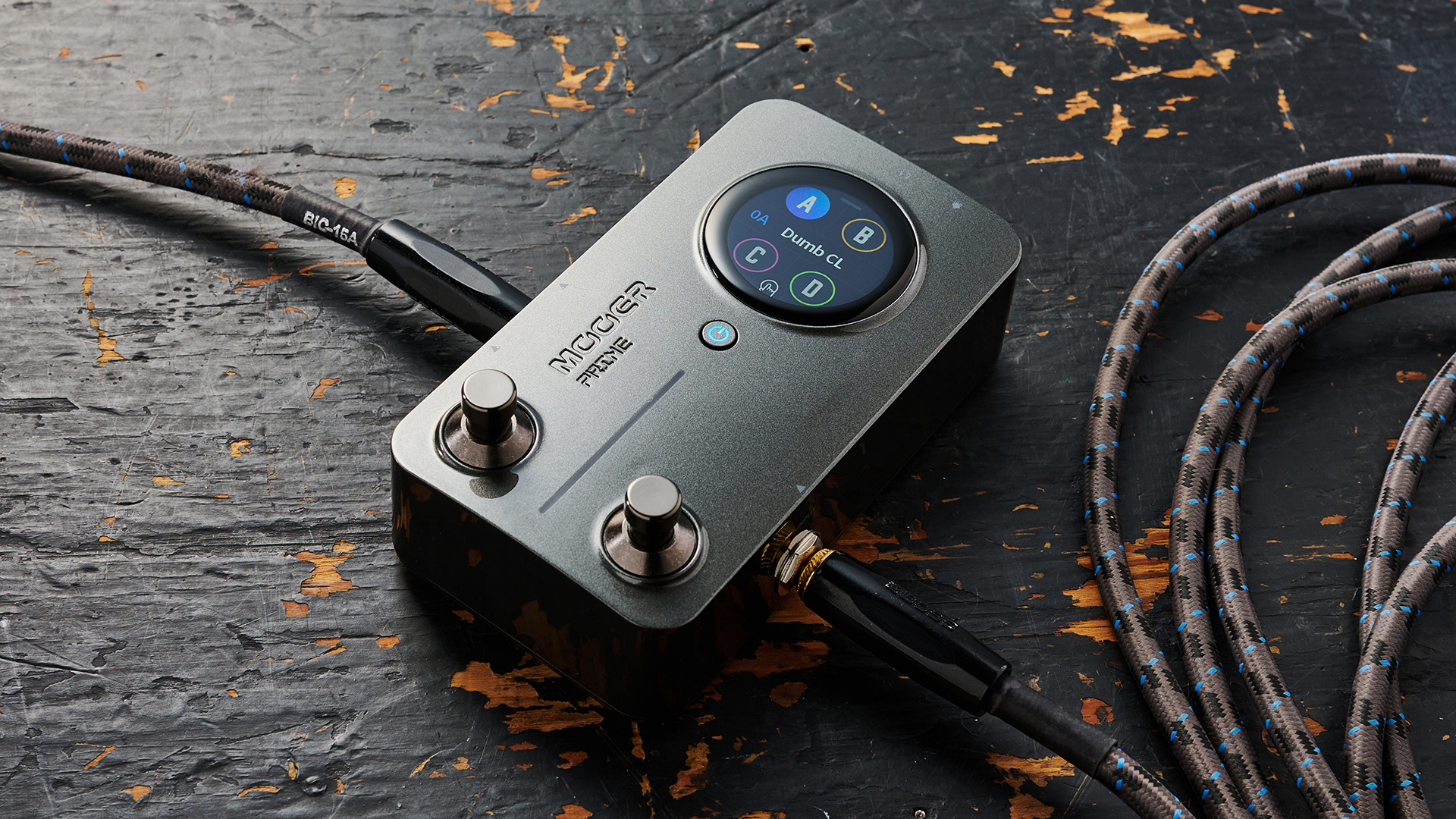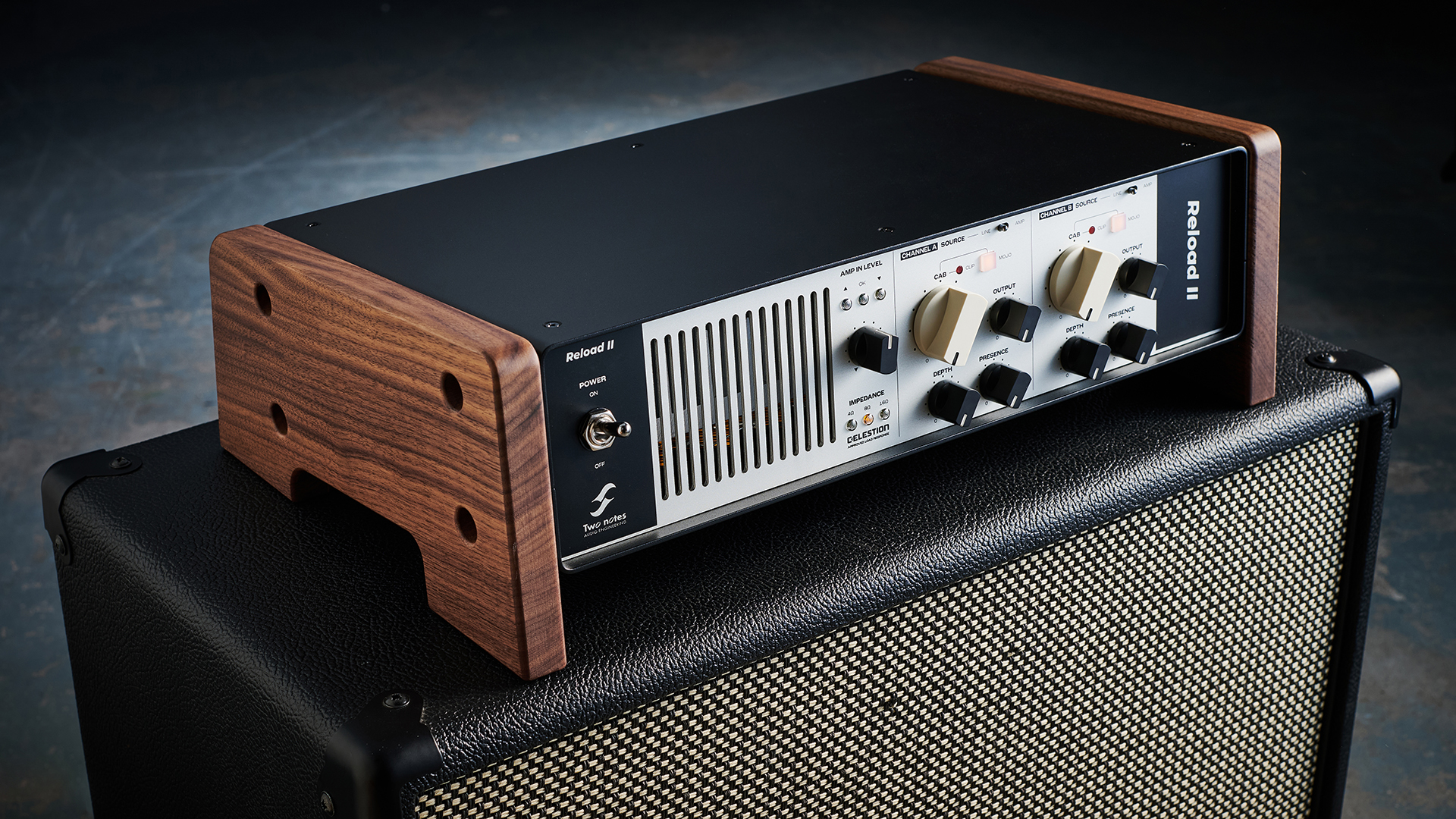MusicRadar Verdict
Zoom’s most affordable Handy Recorder may not be as feature rich as some of its siblings but it gets the basics right, is impressively compact and is very easy to use.
Pros
- +
32-bit float audio format for trouble free recording.
- +
Compact and light.
- +
Excellent value.
- +
Micro SDHC and SDXC storage up to 1TB.
- +
USB-C connection for power, audio and data.
Cons
- -
No adjustment of XY mic.
- -
Accessories pack adds to price.
MusicRadar's got your back
What is it?
Zoom’s Handy Recorder series offers compact mobile recording for musicians, podcasters, filmmakers and content creators and has been massively enhanced by the adoption of 32-bit float recording.
The new H1 Essential is the simplest and cheapest unit in the range, and yet it still packs a punch in terms of features. It’s a stereo field recorder with a pair of on-body cardioid mics in a fixed 90-degree XY configuration. It records to a micro SD card (SDHC or SDXC) in 32-bit float with a choice of three sample rates, 44.1, 48 or 96kHz.
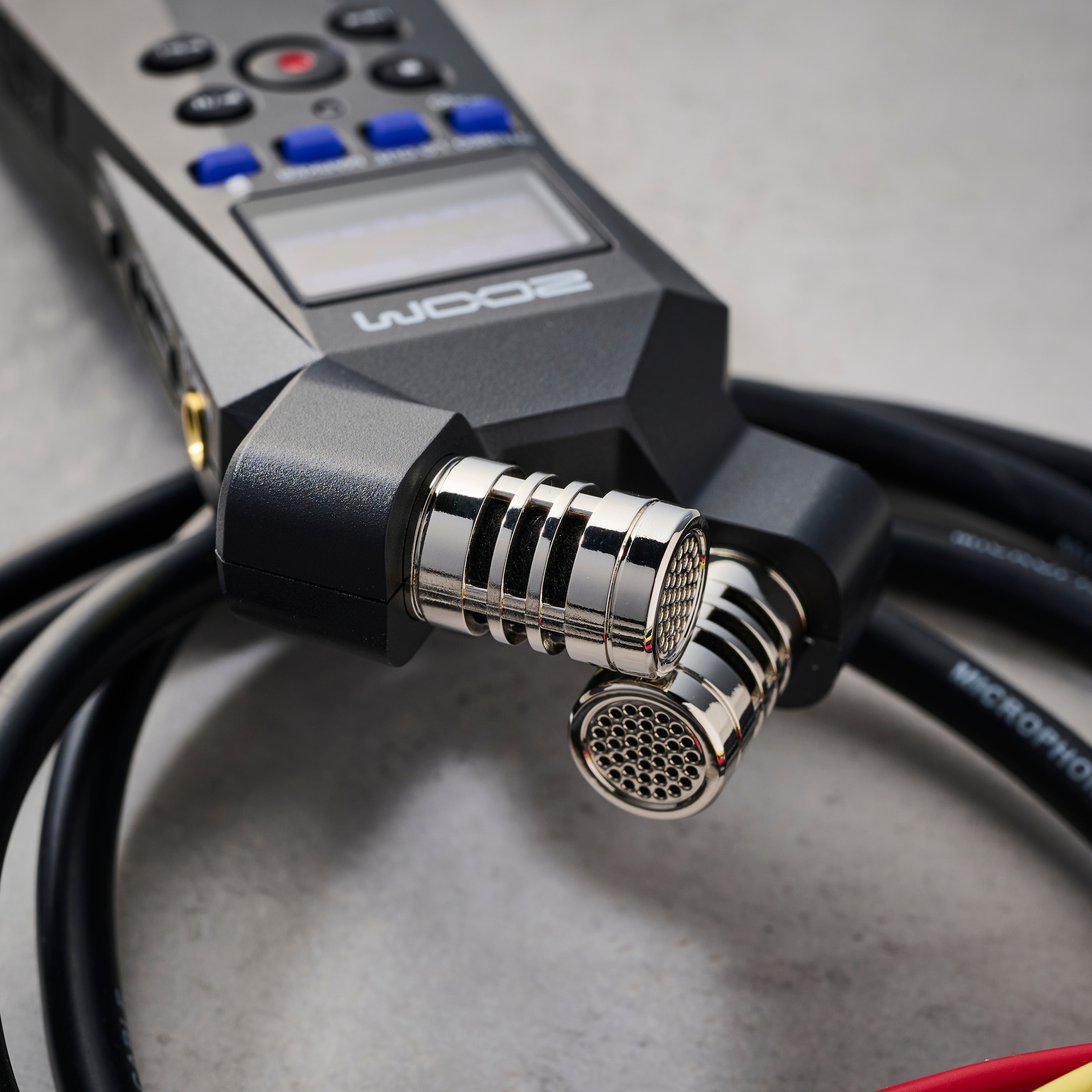
On the side you’ve also got a 3.5mm line/mic input, which is perfect for either a stereo line level source or a lavalier mic – connecting to this input deactivates the onboard mics.
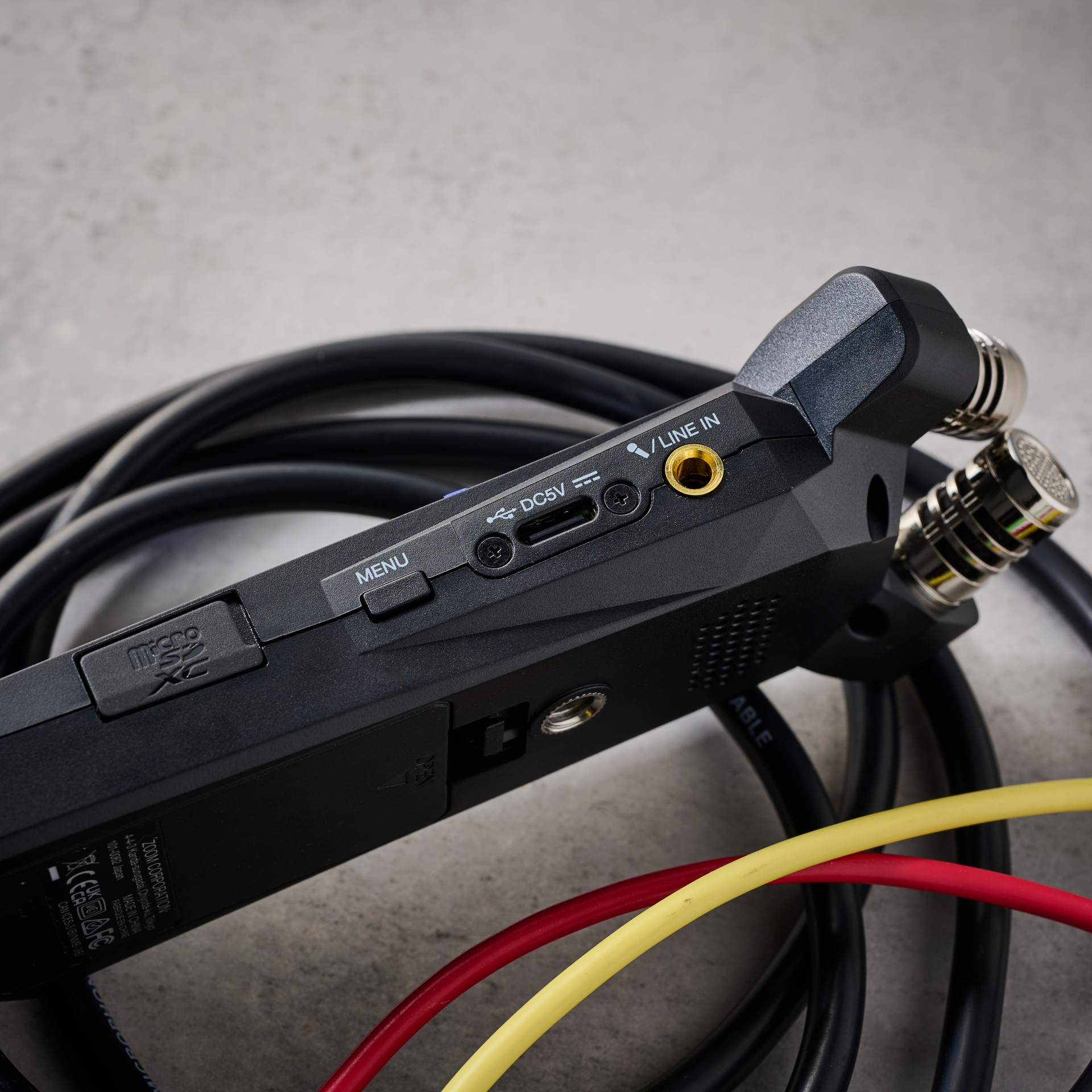
Monitoring is via the 3.5mm line/headphone output on the left side panel or you can use the tiny speaker on the back. Levels to both are controlled by the side-mounted volume dial.
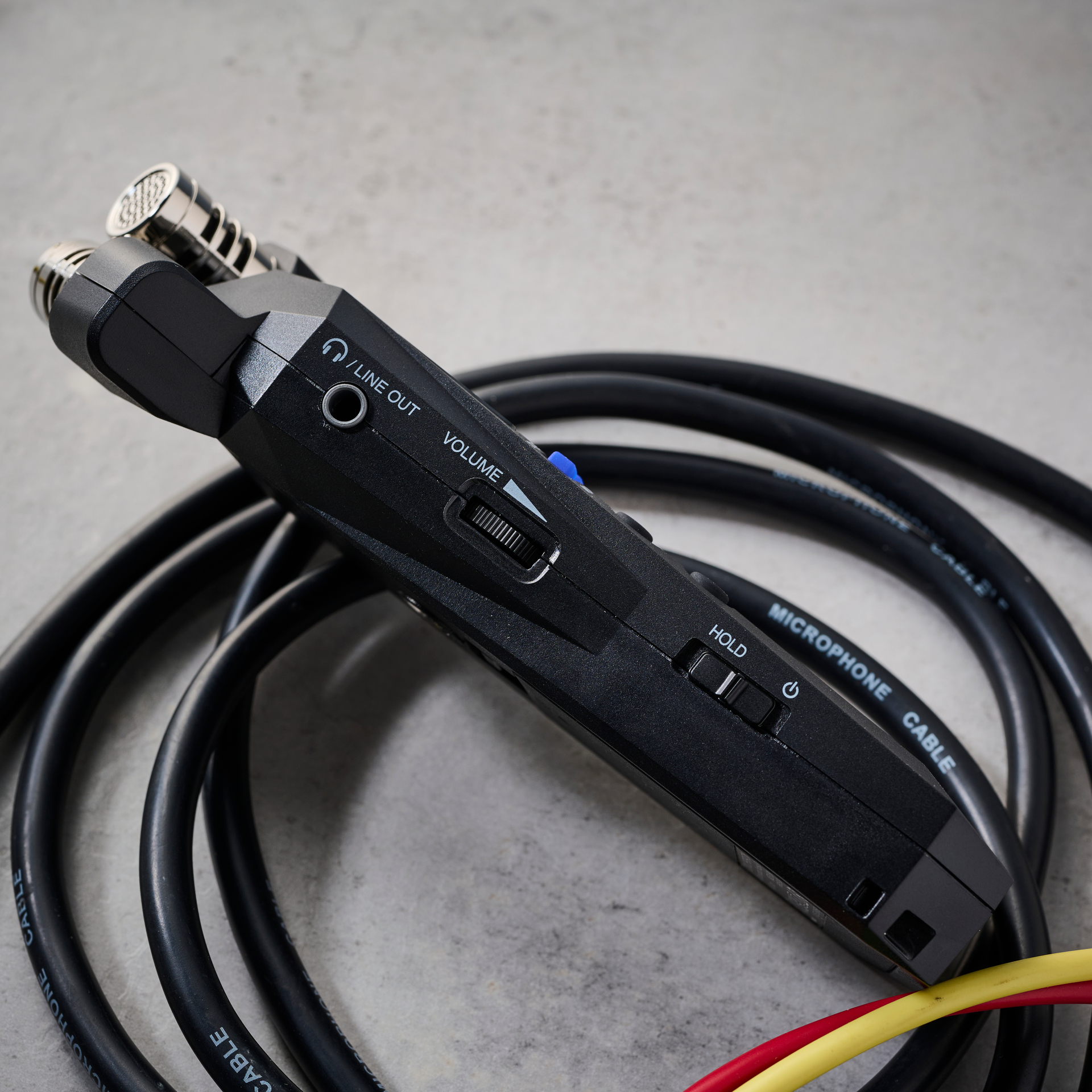
The H1 Essential’s power comes from 2 AAA batteries, and maximum operation time depends on the type of batteries used (alkaline, NiMH or Lithium). Alternatively, you can power the H1 Essential via its USB-C port on the side. The USB port also allows you to connect it to any USB audio-compliant device (PC, Mac, iOS, Android). This provides two options – USB mic mode, which delivers a stereo stream to your device (48kHz/16-bit) or USB data mode, which facilitates the transfer of your recordings from the internal micro SD.
For recording, there are navigation buttons on the top panel, including a dedicated mono/stereo selector (L&R signals are summed for mono) and a dedicated low cut filter selector (off, 80, 160, 240Hz). Meanwhile, a red LED indicates that recording is in progress. Further device settings are made via the mini OLED display, which is accessed using the menu button on the right-hand side.
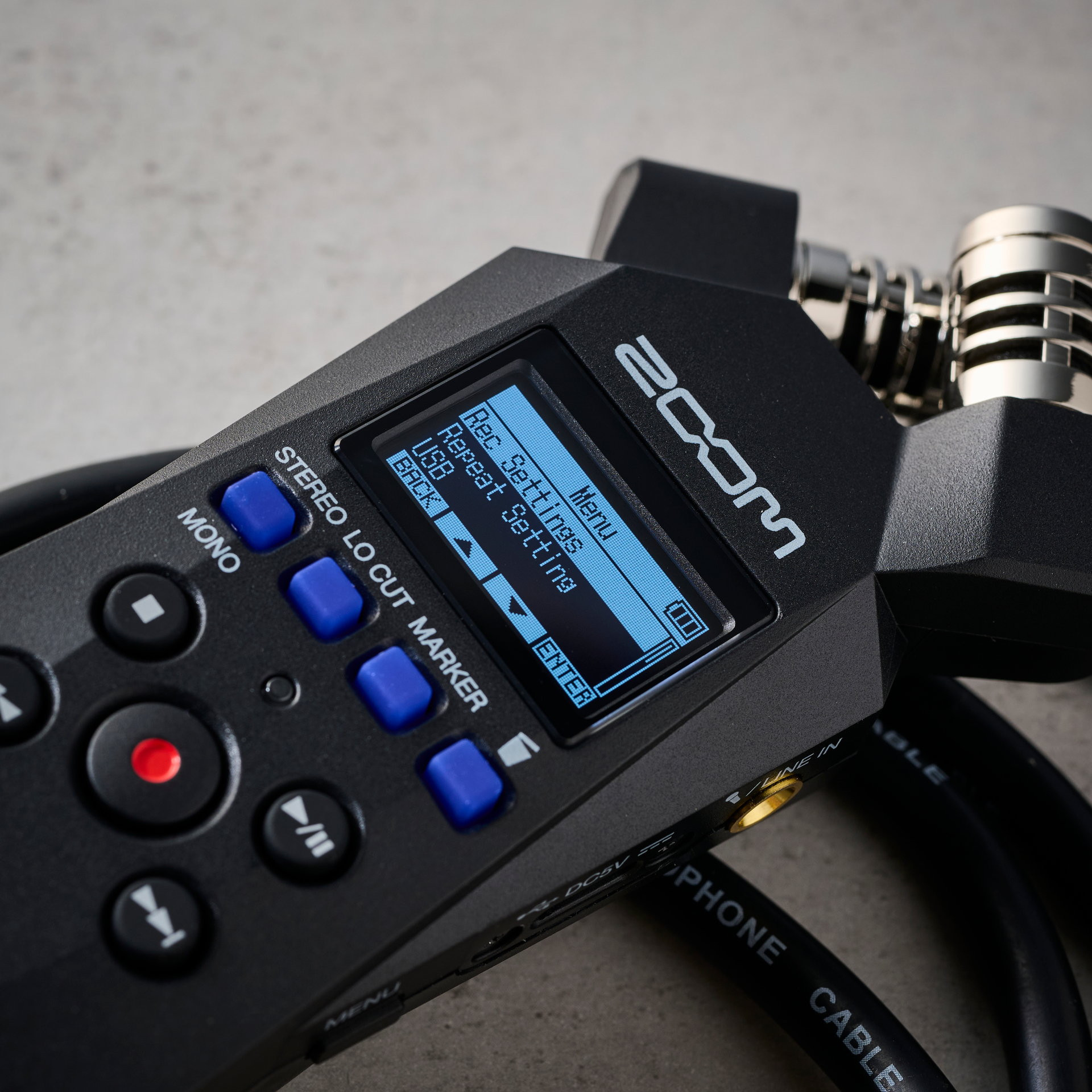
Pricing
- Full price: €119
- APH-1e Accessories Pack €43
While the accessories pack may seem like an unnecessary expense, those who are intending to use the H1e out and about might consider it a worthy investment. The entire essential range doesn't feel as robust as previous models, so a bespoke case could be a good shout. Plus, you get an adapter, USB cable and windscreen.
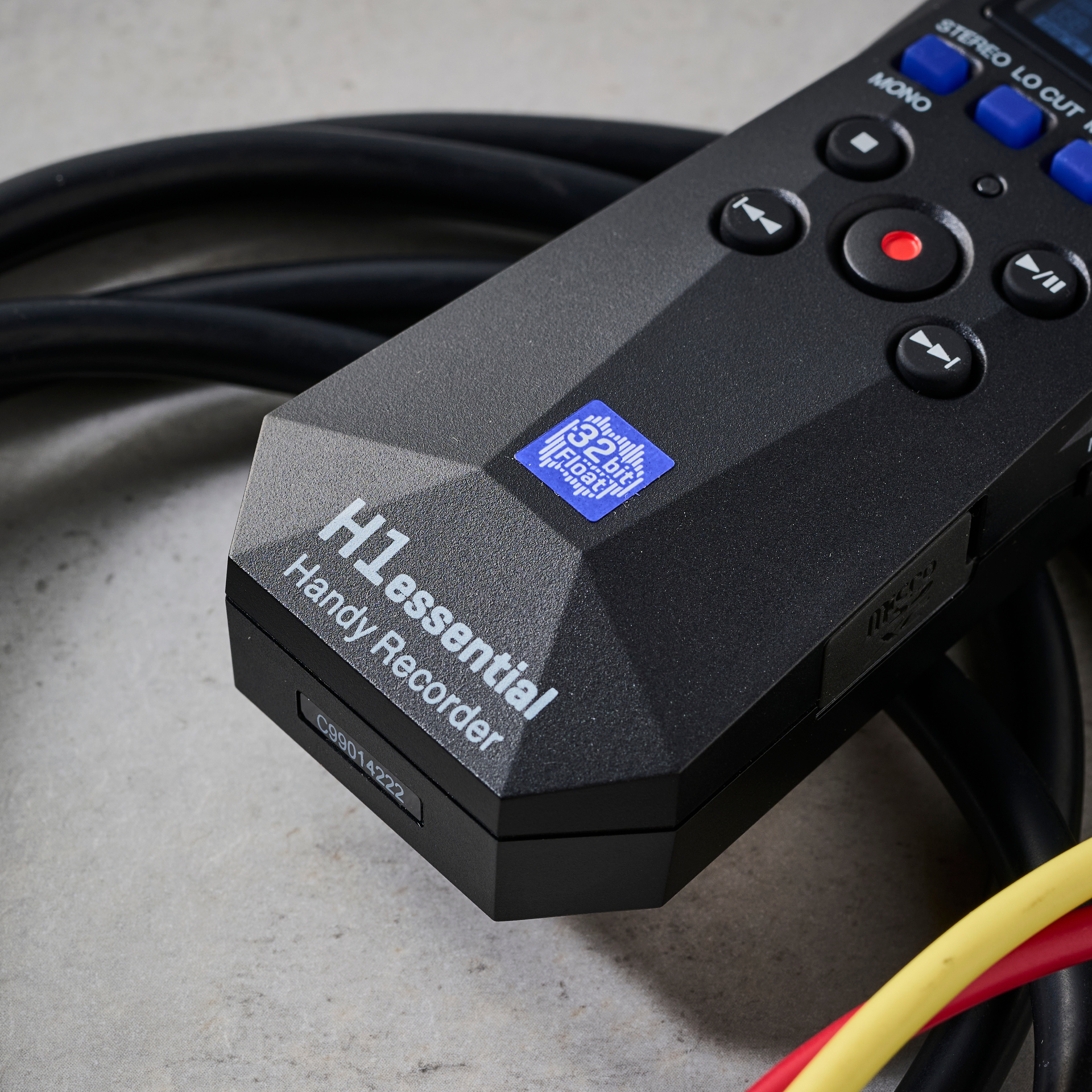
Performance
H1 Essential is impressively compact and, at 92g including batteries, easily light enough to stick or velcro to another device. You’ve also got a standard camera thread on the bottom, should you want to mount it properly. What’s more, for hand-held use, the onboard controls and menu-driven design are easy to manipulate one-handed, which is very welcome.
A major plus point of Zoom’s Handy Recorders is the gain-free 32-bit float design. This makes setup quick and also means there’s no nasty peak limiter to compromise your recordings. Indeed, the audio recordings we made were crisp and clean, with the XY coincident design delivering a focused, though not particularly wide stereo image. With that in mind, adjustable mic orientation would certainly be a welcome addition.
Next up, although the 32-float system solves clipping, the on-body mics are still sensitive and need to be treated accordingly. The H1 specs quote a maximum SPL of up to 120dB, which should cover most eventualities. Nevertheless, it’s still important to avoid or minimise plosives and wind. So, if you’re going to be field recording, you might also want to grab Zoom’s APH-1e accessories pack (€43), which includes the ideal large hairy windscreen, along with a USB PSU, USB cable and carry case.
From an operational perspective, H1 Essential has a number of useful recording settings, including auto start, start test tone, 2 sec pre-record and delay timer. You can also select existing recordings and overdub onto them. What’s more, although the native recording format is 32-bit float, you can also export in 16-bit and 24-bit if you wish. Finally, H1 Essential includes an accessibility feature with optional audible description to accompany the settings menu, and we found this pretty useful in the field.
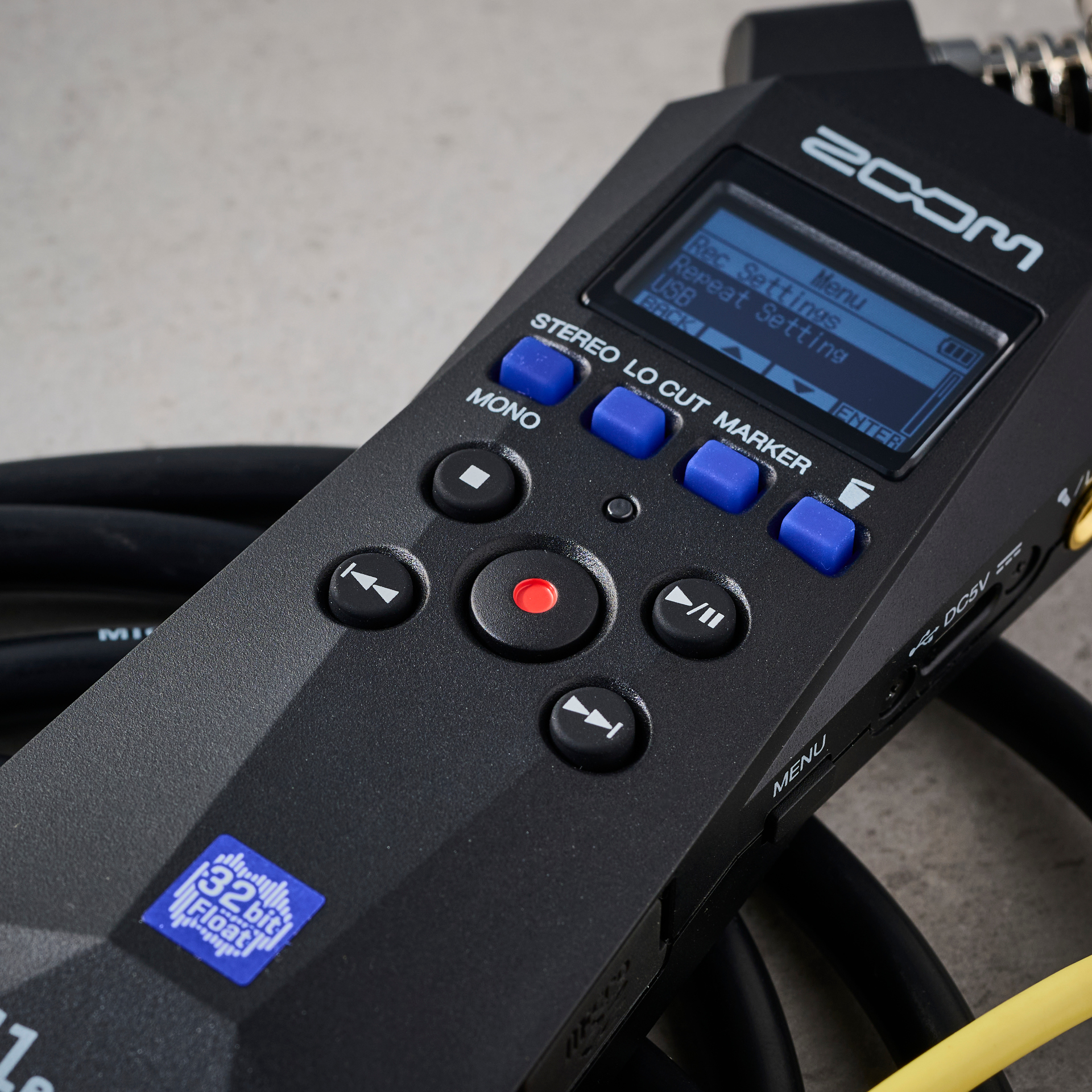
Verdict
Inevitably, the H1 Essential lacks some of the flexibility found in Zoom’s more expensive Handy Recorders. Even so, it’s a clear winner on portability and ease of use, and at €119/£99, it offers fantastic value.
Hands-on demos
ZoomSoundLab
Alternatives
Tascam recorders are both reliable and popular, and the latest XP version includes 32-bit float recording.
Read more about Tascam DR-05XP
If you want the recorder aspect but with the flexibility to use your own mics, then this pocket-sized device is a great choice.
Read the full Zoom H1 XLR review
Specifications
Built-in Mics | coincidental cardioids in XY configuration |
Sensitivity | 14 mV/Pa |
Inputs | mic/line 3.5mm jack, |
Outputs | line/headphone 3.5mm jack |
Input Low Cut | off, 80, 160, 240Hz |
Recording | 44.1/48/96 kHz, 32-bit float, stereo/mono |
Formats | WAV, BWF, iXML |
Recording media | micro SDHC (4 to 32GB), micro SDXC (64GB to 1TB) |
Display | OLED 128 x 64 |
USB | type-C connector, USB 2.0 high speed, USB audio 48kHz/16-bit |
Power | 2xAAA batteries, USB bus power or external USB PSU (not included) |
Battery duration continuous operation (hours): | alkaline (10), NiMH (9), lithium (18) |
Size | 136.6(l) x 53.9(w) x 29(d) mm |
Weight | 92g including batteries |
Accessories | Optional APH-1e Accessories Pack – hairy windscreen, padded shell case, AD-17 USB PSU, USB-C cable |
Contact |
Jon is a London based platinum award winning mixer, producer, composer and club remixer with a diverse CV that spans dance, pop, rock and music for media. He’s also a long term contributor to MusicRadar's music technology tutorials and reviews. Whether working alone or collaborating he usually handles final mixdowns, so you’ll also find MusicRadar peppered with his handy mixing tips.
You must confirm your public display name before commenting
Please logout and then login again, you will then be prompted to enter your display name.
“This was 100% a communication from the beyond": Listen to the song that Sammy Hagar claims to have written with Eddie Van Halen in a dream
“I’m imagining it was a very dry, kind of arid, close sound”: Steven Wilson on the challenges of mixing Pink Floyd At Pompeii – MCMLXXII, how the movie captures a band in transition, and why it is “pure Floyd”
“Thank God I was French and my voice was terrible, so I couldn’t write songs - otherwise I would be like any other musician”: Air's Nicolas Godin reflects on the success of Moon Safari
